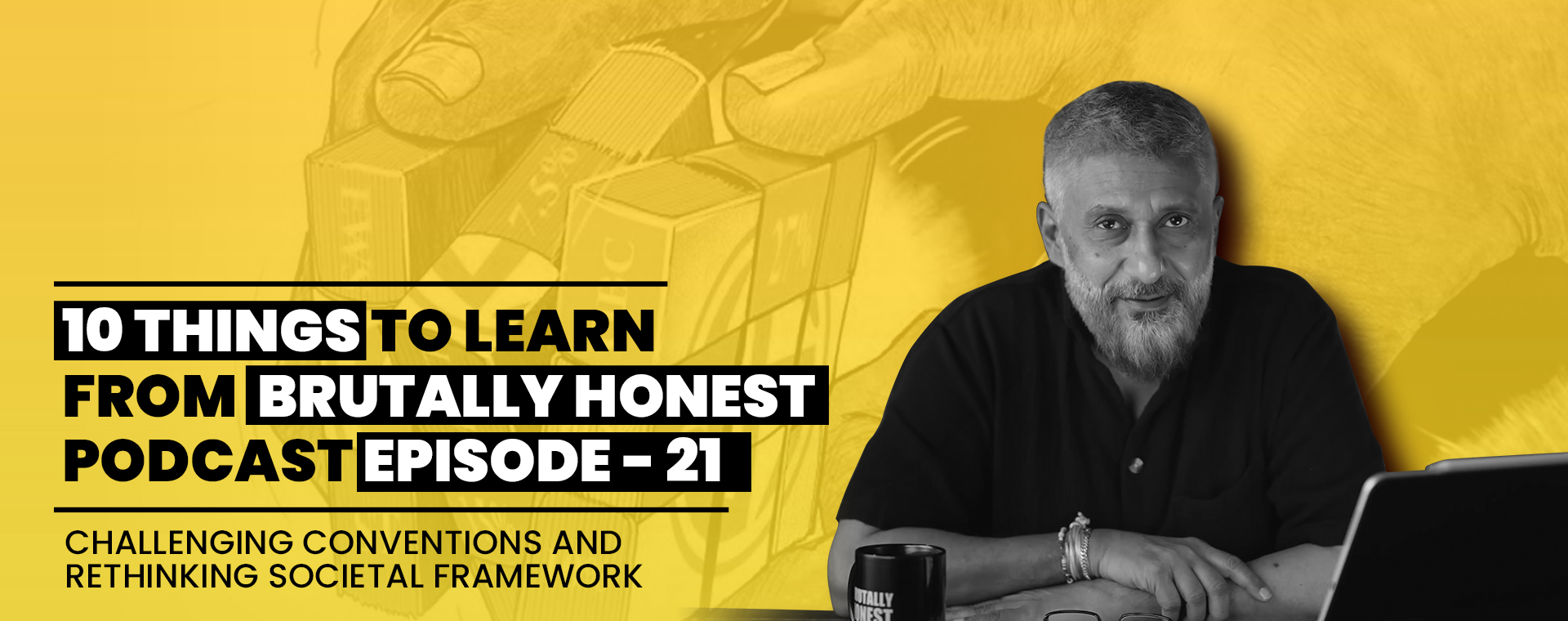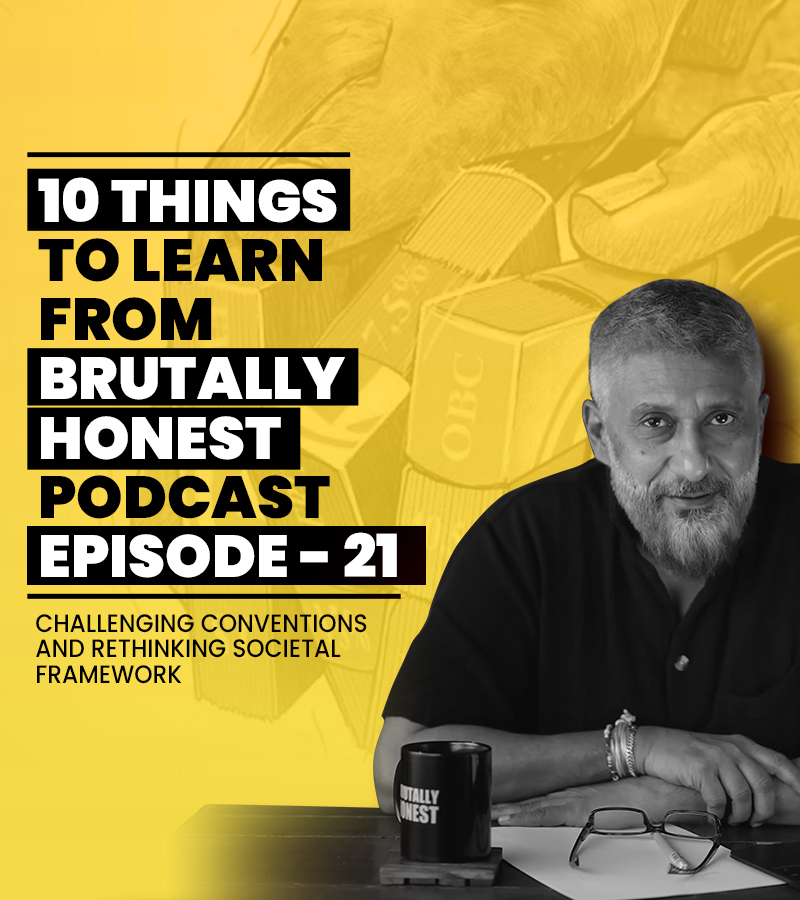

10 Things to Learn from Vivek Agnihotri’s Podcast Ep-21: Caste and Reservation – The Untold Truth of Bharat
It’s time we rethink how these conventional systems shape our society and how they influence our future.
Caste and reservation — two words that are still prevalent in India despite the world living in the 21st century. These two words have shaped the fabric of our social structure as well as the political landscape, dictating how we, as citizens, interact with the world around us.
In Episode 21 of #BrutallyHonest with VRA, Vivek Ranjan Agnihotri dissects these two words, challenging our doctored notions of their concepts and offering a different take on one of the most heated debates in the country.
We list 10 key takeaways from the episode to highlight India’s historical and modern realities of caste and reservation.
1. The Origins of the Caste System
In his podcast, Agnihotri addresses the misunderstood origins of the caste system. Contrary to popular belief, the caste system wasn’t always an identity division tool but instead created to function as a flexible social organization of labour. It originated based on profession and not birth. He sheds light on how this system gradually transformed into an inherited hierarchy.
2. Caste in Modern India
And here we are now, squaring our shoulders over being a modern, democratic nation when caste still casts a subtle shadow over our phenomenal progress. From job opportunities and marriages to politics and caste-based reservations, there still stands a distinction, especially in rural areas. Agnihotri points out that, just like us, caste has adapted to the modern world by evolving from a glaring division to a subtle but visible distinction.
3. Reservation: A Double-Edged Sword
The next level of this debate is reservation. Conceived to uplift marginalised and vulnerable communities, reservation has been the flagbearer of opportunities, but not without sparking controversies. Agnihotri speaks about various other branches of the consequences of reservation. From reverse discrimination and a wider social division to the sidelining of merit-based opportunities to favour the quota systems. The concept has helped several while sparking resentment in others, making us question whether it’s a tool for equality or social divide.
4. Untold Stories of Discrimination
Apart from what the mainstream media reports, there are some hard-hitting untold truths about how caste-powered discrimination has carved up both rural and urban India. We’re already well aware of the discrimination in the education and employment sectors, and Agnihotri also highlights the daily ostracization of Dalits as part of the harsh realities that vulnerable groups face even today. Most of us don’t pay much attention when it’s not happening to us but Agnihotri points out that a historical system that’s still at large today is something we all should be concerned about.
5. The Merit vs. Reservation Debate
The age-old debate of merit vs. reservation — something we all experienced on either side of the coin. While some support reservation as a method to correct historical wrongs and others argue that it buries meritocracy, Agnihotri questions whether it’s an either-or situation. He encourages the audience to have a more refined outlook, suggesting that merit and reservation don’t necessarily have to be mutually exclusive. He points out that in a debate, nothing can be black or white; there’s a middle ground we must all be ready to accept. In this case, he suggests that both can coexist if implemented relatively and wisely.
6. The Political Manipulation of Caste
For a system so heavily tainted with politics, it would be an injustice not to speak about how it’s often used as a tool for power. Agnihotri discusses how people in power have manipulated the caste system in their favour, mainly through vote bank politics. This manipulation has succeeded in creating an identity-based division, turning people against each other.
7. Economic vs. Caste-Based Reservation
Keeping the recent political climate in mind, Agnihotri questions whether reservations should be based on economic conditions rather than caste. He counters by questioning the relevance of merely a case-based reservation policy in today’s society, where the economic imbalance often overpowers caste lines. If the pendulum sways towards the economic side, perhaps a few inequalities not bound by just caste identity could be addressed.
8. The Impact of Reservation on Education
Education can bring us on a similar page when it comes to equalizing. Agnihotri explains how reservation policies have shaped an already tainted educational atmosphere, raising questions on whether these policies genuinely level the playing field or compromise merit and standards. He also shares how students on either side of the coin experience the reservation system, especially in terms of standards and equal opportunities.
9. Urban vs. Rural Realities of Caste
Now, we come to the aspect of the prevalent urban-rural divide. While urban areas have mastered the image of caste-free modernity, rural areas paint a different picture. Still deeply submerged in caste politics, the caste system blemishes even basic services like education, healthcare, and water in rural areas. This vast difference sheds light on the hierarchies clouding the already orthodox mentality of the citizens of these areas.
10. The Future of Caste and Reservation in India
Finally, Viveks asks us to look at the future and how it can be different pertaining to caste. Can caste truly ever disappear from our society? Can the reservation system transform into something that supports modern India instead of weighing it down? While hard to predict, Agnihotri leaves us with hope — that perhaps the future sees both caste and economic disparities being addressed in tandem. And each system evolves with time.
Conclusion
While we’re not the first or the last to have this debate regarding the caste and reservation system, Agnihotri’s podcast episode reminds us to have a more balanced and nuanced approach toward the two. The point is not to take a side but rather to keep the conversation going if we ever want to present a concluding argument.
This episode isn’t just about exposing the untold truths but also about questioning a system that shaped our past and present and could further distort our future. So, join the conversation and share what you think about this particular topic in the YouTube comments.






